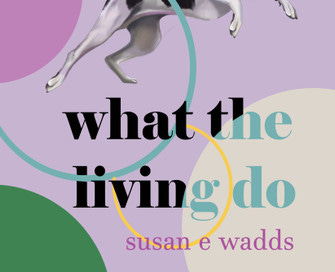In my debut novel, What the Living Do, my protagonist, Brett, grapples with guilt for the deaths of her baby sister and father. Because she tossed three-year-old Goldie from her bed, the child was in a closet when the house fire broke out. After saving Brett, their father rushed back in to find Goldie. But it was too late. We meet Brett when she’s thirty-seven and still carrying the weight of those long-ago deaths. She brings that heaviness into her relationship with Cole, the young man she lives with, but in her attempts to keep it to herself, she creates distance between them. In fact, her guilt places walls between her and all who care about her.
Many years ago, I was a guest of two friends in their Paris flat. At the time I was waiting for Christmas when my Canadian lover was to meet me in Rome. When I’d met David months before leaving Canada I considered not embarking on my planned worldwide journey, but he’d insisted I go, promising a holiday together before I left Europe for Africa. When I received word that he couldn’t afford to come, I didn’t want to upset my hosts with my sorrow so I kept to myself. I detest being unhappy so I have a tendency to deny that state, even to myself. The fear is that no one will love me if I’m a sad-sack. Since I consider myself a fairly generous person, I was shocked when Evelyn observed that she found me selfish and unwilling to share. It made me realize the distance my silence had created.

When we open up to those we trust with so-called negative emotions or thoughts, we may be surprised at how they respond. Recently, I was devastated by a nasty turn of events, where someone to whom all care and compassion had been extended behaved in a particularly egregious manner. What helped enormously to get me through the trauma was knowing I had a friend who would listen.
Today, a show on CBC radio discussed how in society friendship is considered less valuable than romance, but how friendship can be tremendously intimate and profound in ways that romance can miss. It made me think about my precious friendships, and how much they mean to me, and how grateful I am for their company and wisdom.
In the past, I’ve messed up friendships—important ones that were dear to me—for various reasons. For not paying attention. For being too self-absorbed. For being indiscreet. For not speaking up. For saying too much. And possibly other offenses. These losses of friendship have so grieved me that I have vowed to do my best from here on in to not be an asshole.
In What the Living Do, Brett is definitely an asshole—she’s self-absorbed and mealy-mouthed. The question I faced when writing the story, was how to bring her to the realization that the way she treated herself and those who loved her wasn’t giving any of them what they needed.
It occurs to me that in three of the novels I’ve written, the main character seeks advice from someone they perceive as wise. Not their friends or loved ones, but ones outside their immediate sphere.
In The Soft Ones, the novel completed during my residency in France this past May, Katie visits a homeless (unhomed?) woman in the park, hoping she’ll shed light on her predicament, which she does in a not very palatable manner. Otherwise, she has a straight-talking best friend, Lorraine, with whom she argues and pushes back.
In One Way Home, young Carrie befriends a nineteen-year-old street person, with the belief that she is helping, and possibly saving, her.
In What the Living Do, Brett confides in her work partner, Mel, a sixty-something Indigenous man who seems perplexed and somewhat amused by her projection. Brett has a close friend who has her own struggles and who Brett succeeds in alienating.
All three stories are quite different but there does seem to be a fairly recognizable thread regarding friendship running through them.

What I’m noticing about my personal stories and my written ones is that keeping a lid on our true feelings isn’t likely to engender trust or closeness with those we love. And we may find that those who truly care will want to know what is on our hearts. The good, the sad, and even the ugly.
Just tell the truth.






What a delightful and honest newsletter. The paragraph about the CBC show really resonated with me. I have a very dear group of girlfriends--some of whom I've known for 40 years--and our connection is among the most cherished and valued aspects of my life. I am grateful for them every day. Thank you for sharing these words so beautifully, Deepam. Can't wait to read your novel! :)
While the context of my memoir-in-progress is different from the thread of your novels, I come to a similar conclusion. Telling the truth is essential to being an effective healthcare team member.